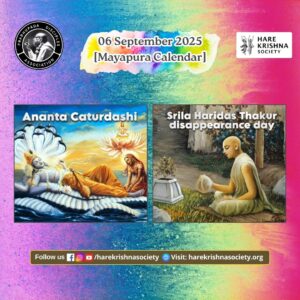Hare Krsna-I was reading the verse below at breakfast time and felt inspired to send it and a few others out as well. For those who are somewhat serious about spiritual life, they will find in these purports, verses and classes of Srila Prabhupada very informative and useful on a practical level. We don’t want theory, we want something practical that can be applied daily in our lives that will bring the desired result-no more birth and death, and love for God-Krsna. Here below, is such an approach.
damaghosa das
———————————-
SB 3.26.7-Material consciousness is the cause of one’s conditional life, in which conditions are enforced upon the living entity by the material energy. Although the spirit soul does not do anything and is transcendental to such activities, he is thus affected by conditional life.
PURPORT-The Māyāvādī philosopher, who does not differentiate between the Supreme Spirit and the individual spirit, says that the conditional existence of the living entity is his līlā, or pastime. But the word “pastime” implies employment in the activities of the Lord. The Māyāvādīs misuse the word and say that even if the living entity has become a stool-eating hog, he is also enjoying his pastimes. This is a most dangerous interpretation. Actually the Supreme Lord is the leader and maintainer of all living entities. His pastimes are transcendental to any material activity. Such pastimes of the Lord cannot be dragged to the level of the conditional activities of the living entities. In conditional life the living entity actually remains as if a captive in the hands of material energy. Whatever the material energy dictates, the conditioned soul does. He has no responsibility; he is simply the witness of the action, but he is forced to act in that way due to his offense in his eternal relationship with Kṛṣṇa. Lord Kṛṣṇa therefore says in Bhagavad-gītā that māyā, His material energy, is so forceful that it is insurmountable. But if a living entity simply understands that his constitutional position is to serve Kṛṣṇa and he tries to act on this principle, then however conditioned he may be, the influence of māyā immediately vanishes. This is clearly stated in Bhagavad-gītā, Seventh Chapter: Kṛṣṇa takes charge of anyone who surrenders to Him in helplessness, and thus the influence of māyā, or conditional life, is removed.
BG 4.20-Abandoning all attachment to the results of his activities, ever satisfied and independant, he performs no fruitive action, although engaged in all kinds of undertakings.
PURPORT-This freedom from the bondage of actions is possible only in Kṛṣṇa consciousnesswhen one is doing everything for Kṛṣṇa. A Kṛṣṇa conscious person acts out of pure love for the Supreme Personality of Godhead, and therefore he has no attraction for the results of the action. He is not even attached to his personal maintenance, for everything is left to Kṛṣṇa. Nor is he anxious to secure things, nor to protect things already in his possession. He does his duty to his best ability and leaves everything to Kṛṣṇa. Such an unattached person is always free from the resultant reactions of good and bad; it is as though he were not doing anything. This is the sign of akarma, or actions without fruitive reactions. Any other action, therefore, devoid of Kṛṣṇa consciousness, is binding upon the worker, and that is the real aspect of vikarma, as explained hereinbefore.
Dec 26 1972 Bombay lecture…This material world is called pavarga. Pa, pha, ba, bha, ma. According to Sanskrit grammar, there are five vargas, ka varga ca varga ta varga ta varga and pa varga. So pa varga, pa means pariśrama. Similarly, pha means phena, and bha means bhaya (?), ma means mṛtyu. So this material world is pavarga, means here we have to labor very hard. Sometimes by laboring, as you have seen in animals, bulls and horses, they produce foam in the mouth, that is pha. And then we are always full of anxieties, and at last there is death. This is material life. We work very hard, struggle for…, struggle hard for existence, and that also, at the end, we die.
So people have become so much foolish that they do not see the defects of the material…, materialistic way of life. They think only that the time, the small duration of life, if you can somehow or other gratify your senses, that is perfection of life. This is called ignorance, mūḍhaḥ. That is described in the śāstras: sa eva go-kharaḥ [SB 10.84.13]. Go-kharaḥ means animal, like cows and asses. This is not life. So religious life, dharmasya hy āpavargasya. One should become religious or accept religious principle to stop this pavarga, the different kinds of hard struggle for existence. To stop, that is the purpose of dharma. But generally people execute dharma to get some artha. Dharma artha. Artha means some material profit. So Sūta Gosvāmī said that dharmasya hy āpavargasya na artaḥ arthāya upakalpate. Arthaya, for some material profit, does not mean. Of course, if you take the meaning of artha as paramārtha, that is required. But material profit, as it is stated here in the Śrīmad-Bhāgavatam by Sūta Gosvāmī, that to go to the church or to the temple or to become a religious person, does not mean that it is meant for improving your material condition. Generally, people come to us or the temple for asibha (?). What is that asibha? “Now I have got five hundred rupees income. Please give me asibha it may become five thousand.” So this is not the purpose of dharma. Here it is stated, dharmasya hy āpavargasya na artaḥ arthāya upakalpate.
Then we require artha. Without artha, without money, how we can live? That is also explained here,nārthasya dharmaikāntasya kāmo lābhāya hi smṛtaḥ. You require money, that’s all right, but not for sense gratification, not for going to the cinema. Here in Bombay city, people are earning money, lots of money, but we see there are lots of cinemas advertised, and people go there—there are hundreds and thousands of cinema houses—and spend their money. They’re standing for three hours, four hours to take a ticket for going to the cinema. Therefore actually those who are going to be religious for getting relief from this hard struggle for existence, for them arthasya, you require some artha, money… Nārthasya dharmaikāntasya. If you are actually religious, then your artha should not be spent for sense gratification. Na tasya dharmaikāntasya kāmo lābhāyo hi smṛtaḥ. Kāmaḥ means sense gratification. It should be properly utilized, if you have got money, that you should be properly utilized, not for sense gratification-wine, women, and hotel, and cinema. No. Then by your artha you are going to hell. Artha, everything.
Cāṇakya Paṇḍita, the great politician, he says… He was not a…, he was a religious brāhmaṇa, but he was not for salvation—he was more or less politician—still he says, san-nimitte varaṁ tyāge vināśe niyate sati. San-nimit, if you have got some money, it will be spent up. In your life or your next life, your son’s life, it will be spent up. Vināśe niyate sati, that is the nature’s way. Suppose you earn crores of rupees. It will not stay after one generation, after two generations. It will not stay, because in this material world, Lakṣmī, the goddess of fortune, is called cañcalā. She does not remain at one place. We have got experience. Today one man is very rich; next generation is no longer rich. That is also nationwise applicable. Just like we have seen British Empire. While I was in London I was thinking that “These Britishers brought money from all parts of the world, by business or all other means.” I saw in front of St. James Park, Lord Clive’s statue. Very, very nice buildings, but it is now difficult for them to repair. That opulence has gone. They have lost their empire. No more income, sufficient income. This is the nature of material world. So many empires were there. There was Roman empire, there was Carthaginian empire, there was Mogul empire, there was British empire, and so many empires. They are no longer existing. Sometimes when I pass by the side of the Red Fort, we see the department, the apartments of the great Mogul emperors in Red Fort, they are now lying vacant. So this is the material nature. Therefore Cāṇakya Paṇḍita advises, san-nimitte varaṁ tyāgo vināśe niyate sati: “If you are actually religious, then don’t spoil your money for sense gratification.” Use it for sat karyam. Sat karya means for service of Kṛṣṇa. Oṁ tat sat paraṁ brahma. San-nimi. San-nimitte varaṁ tyāgo vināśe niyate sati. That is Vedic civilization. If money comes, you don’t hate it. Welcome. But it should be used properly. That is proper use. If you use properly your money, then you make your path parapavarga, clear. And if you misuse your money, then you become again entangled in the 8,400,000’s of species of life.


